|
|
|
Sort Order |
|
|
|
Items / Page
|
|
|
|
|
|
|
| Srl | Item |
| 1 |
ID:
175342
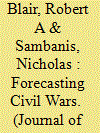

|
|
|
|
|
| Summary/Abstract |
Does theory contribute to forecasting accuracy? We use event data to show that a parsimonious model grounded in prominent theories of conflict escalation can forecast civil war onset with high accuracy and over shorter temporal windows than has generally been possible. Our forecasting model draws on “procedural” variables, building on insights from the contentious politics literature. We show that a procedural model outperforms more inductive, atheoretical alternatives and also outperforms models based on countries’ structural characteristics, which previously dominated models of civil war onset. We find that process can substitute for structure over short forecasting windows. We also find a more direct connection between theory and forecasting than is sometimes assumed, though we suggest that future researchers treat the value-added of theory for prediction not as an assumption but rather as a hypothesis to test.
|
|
|
|
|
|
|
|
|
|
|
|
|
|
|
|
| 2 |
ID:
178726
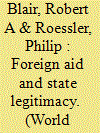

|
|
|
|
|
| Summary/Abstract |
What are the effects of foreign aid on the perceived legitimacy of recipient states? Different donors adhere to different rules, principles, and operating procedures. The authors theorize that variation in these aid regimes may generate variation in the effects of aid on state legitimacy. To test their theory, they compare aid from the United States to aid from China, its most prominent geopolitical rival. Their research design combines within-country analysis of original surveys, survey experiments, and behavioral games in Liberia with cross-country analysis of existing administrative and Afrobarometer data from six African countries. They exploit multiple proxies for state legitimacy, but focus in particular on tax compliance and morale. Contrary to expectations, the authors find little evidence to suggest that exposure to aid diminishes the legitimacy of African states. If anything, the opposite appears to be true. Their results are consistent across multiple settings, multiple levels of analysis, and multiple measurement and identification strategies, and are unlikely to be artifacts of sample selection, statistical power, or the strength or weakness of particular experimental treatments. The authors conclude that the effects of aid on state legitimacy at the microlevel are largely benign.
|
|
|
|
|
|
|
|
|
|
|
|
|
|
|
|
| 3 |
ID:
131502
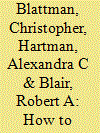

|
|
|
|
|
| Publication |
2014.
|
| Summary/Abstract |
Dispute resolution institutions facilitate agreements and preserve the peace whenever property rights are imperfect. In weak states, strengthening formal institutions can take decades, and so state and aid interventions also try to shape informal practices and norms governing disputes. Their goal is to improve bargaining and commitment, thus limiting disputes and violence. Mass education campaigns that promote alternative dispute resolution (ADR) are common examples of these interventions. We studied the short-term impacts of one such campaign in Liberia, where property disputes are endemic. Residents of 86 of 246 towns randomly received training in ADR practices and norms; this training reached 15% of adults. One year later, treated towns had higher resolution of land disputes and lower violence. Impacts spilled over to untrained residents. We also saw unintended consequences: more extrajudicial punishment and (weakly) more nonviolent disagreements. Results imply that mass education can change high-stakes behaviors, and improving informal bargaining and enforcement behavior can promote order in weak states.
|
|
|
|
|
|
|
|
|
|
|
|
|
|
|
|
| 4 |
ID:
165168


|
|
|
|
|
| Summary/Abstract |
What are the effects of international intervention on the rule of law after civil war? Rule of law requires not only that state authorities abide by legal limits on their power, but also that citizens rely on state laws and institutions to adjudicate disputes. Using an original survey and list experiment in Liberia, I show that exposure to the UN Mission in Liberia (UNMIL) increased citizens’ reliance on state over nonstate authorities to resolve the most serious incidents of crime and violence, and increased nonstate authorities’ reliance on legal over illegal mechanisms of dispute resolution. I use multiple identification strategies to support a causal interpretation of these results, including an instrumental variables strategy that leverages plausibly exogenous variation in the distribution of UNMIL personnel induced by the killing of seven peacekeepers in neighboring Côte d'Ivoire. My results are still detectable two years later, even in communities that report no further exposure to peacekeepers. I also find that exposure to UNMIL did not mitigate and may in fact have exacerbated citizens’ perceptions of state corruption and bias in the short term, but that these apparently adverse effects dissipated over time. I conclude by discussing implications of these complex but overall beneficial effects.
|
|
|
|
|
|
|
|
|
|
|
|
|
|
|
|
| 5 |
ID:
180674
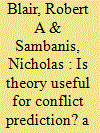

|
|
|
|
|
| Summary/Abstract |
Beger, Morgan, and Ward (BM&W) call into question the results of our article on forecasting civil wars. They claim that our theoretically-informed model of conflict escalation under-performs more mechanical, inductive alternatives. This claim is false. BM&W’s critiques are misguided or inconsequential, and their conclusions hinge on a minor technical question regarding receiver operating characteristic (ROC) curves: should the curves be smoothed, or should empirical curves be used? BM&W assert that empirical curves should be used and all of their conclusions depend on this subjective modeling choice. We extend our original analysis to show that our theoretically-informed model performs as well as or better than more atheoretical alternatives across a range of performance metrics and robustness specifications. As in our original article, we conclude by encouraging conflict forecasters to treat the value added of theory not as an assumption, but rather as a hypothesis to test.
|
|
|
|
|
|
|
|
|
|
|
|
|
|
|
|
| 6 |
ID:
148653


|
|
|
|
|
| Summary/Abstract |
This article examines the legitimacy of the use of force by armed nonstate actors resisting the imposition of state rule over territories they control. We focus on the rights of warlords: subnational strongmen who seek autonomy within geographically demarcated territories, but not secession or control of the state itself. We argue that behind the resistance to state-building lies a twofold question of legitimate authority: the authority of states to consolidate power within their own internationally recognized borders and the authority of warlords to resist that expansion, by force if necessary, when it threatens social order and the protection of basic rights. This article draws on just war theory to develop a set of conditions under which such resistance may be justified, explores the argument's practical implications for state-building under the tutelage of third parties (e.g., the United Nations), and demonstrates its empirical relevance through an application to Afghanistan.
|
|
|
|
|
|
|
|
|
|
|
|
|
|
|
|
| 7 |
ID:
152304
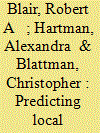

|
|
|
|
|
| Summary/Abstract |
Riots, murders, lynchings, and other forms of local violence are costly to security forces and society at large. Identifying risk factors and forecasting where local violence is most likely to occur should help allocate scarce peacekeeping and policing resources. Most forecasting exercises of this kind rely on structural or event data, but these have many limitations in the poorest and most war-torn states, where the need for prediction is arguably most urgent. We adopt an alternative approach, applying machine learning techniques to original panel survey data from Liberia to predict collective, interpersonal, and extrajudicial violence two years into the future. We first train our models to predict 2010 local violence using 2008 risk factors, then generate forecasts for 2012 before collecting new data. Our models achieve out-of-sample AUCs ranging from 0.65 to 0.74, depending on our specification of the dependent variable. The models also draw our attention to risk factors different from those typically emphasized in studies aimed at causal inference alone. For example, we find that while ethnic heterogeneity and polarization are reliable predictors of local violence, adverse economic shocks are not. Surprisingly, we also find that the risk of local violence is higher rather than lower in communities where minority and majority ethnic groups share power. These counter-intuitive results illustrate the usefulness of prediction for generating new stylized facts for future research to explain. Ours is one of just two attempts to forecast local violence using survey data, and we conclude by discussing how our approach can be replicated and extended as similar datasets proliferate.
|
|
|
|
|
|
|
|
|
|
|
|
|
|
|
|
| 8 |
ID:
187661


|
|
|
|
|
| Summary/Abstract |
How can states prevent armed groups from exploiting local governance gaps to (re)establish territorial control during transitions to national peace? We report results from an experimental evaluation of Colombia’s ComunPaz program, a scalable, inexpensive intervention that sought to replace rebel governance by harnessing complementarities between state and communal authorities and by improving security and justice provision in areas once dominated by FARC, the country’s largest rebel group. We find that ComunPaz enhanced the quality of local dispute resolution, increased citizens’ trust in (some) state institutions, and strengthened coordination between state and communal authorities. It also appears to have reduced citizens’ trust in, and reliance on, armed groups. The program did not, however, increase reliance on either state or communal authorities to resolve disputes, nor did it increase citizens’ trust in communal institutions. We discuss the implications of our findings for peace-building and state-building in countries transitioning from civil war.
|
|
|
|
|
|
|
|
|
|
|
|
|
|
|
|
| 9 |
ID:
193673


|
|
|
|
|
| Summary/Abstract |
Does UN peacekeeping promote democracy in countries wracked by civil war? Existing studies are limited and reach contradictory conclusions. We develop a theory to explain how peacekeepers can help overcome obstacles to democratization in conflict-affected countries, then test our theory by combining three original datasets on UN mandates, personnel, and activities covering all UN missions in Africa since the end of the Cold War. Using fixed effects and instrumental variables estimators, we show that UN missions with democracy promotion mandates are strongly positively correlated with the quality of democracy in host countries but that the magnitude of the relationship is larger for civilian than for uniformed personnel, stronger when peacekeepers engage rather than bypass host governments when implementing reforms, driven in particular by UN election administration and oversight, and more robust during periods of peace than during periods of civil war.
|
|
|
|
|
|
|
|
|
|
|
|
|
|
|
|
| 10 |
ID:
177175


|
|
|
|
|
| Summary/Abstract |
The UN is intimately involved in efforts to restore the rule of law in conflict and postconflict settings. Yet despite the importance of the rule of law for peace, good governance, and economic growth, evidence on the impact of these efforts is scant. I develop a theory to explain when UN rule-of-law reform is likely to succeed, then test the theory using original datasets capturing the number of civilian personnel deployed to each UN mission in Africa, the number of personnel assigned specifically to rule-of-law-related tasks, and the extent and nature of actual rule-of-law-related activities in the field. The correlation between UN presence and the rule of law is weak while conflict is ongoing, but robustly positive during periods of peace. The relationship is stronger for civilian than uniformed personnel, and is strongest when UN missions engage host states in the process of reform.
|
|
|
|
|
|
|
|
|
|
|
|
|
|
|
|
|
|
|
|
|